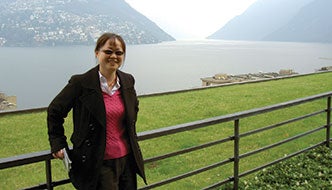 Nuclear engineering expert Emily Liu is an associate professor in the Department of Mechanical, Aerospace, and Nuclear Engineering at Rensselaer. We ask Emily about her work:
Nuclear engineering expert Emily Liu is an associate professor in the Department of Mechanical, Aerospace, and Nuclear Engineering at Rensselaer. We ask Emily about her work:
Q: Your research is fascinating! It spans from nanomaterials, to radiation damage, to nuclear threat detection. What is the overall problem you are trying to solve?
A: My research targets a fundamental problem: How do we link nanoscale observations with macroscale phenomena? In our lab, we utilize laws from physics combined with experiments and simulations to explore this question. The answers we find will be very beneficial for designing and modifying new nano- or macroscale materials, as well as biological or chemical functions.
Outside of the lab and the classroom, what do you like to do for fun?
Many things. I especially like reading books and exercising. When it’s warm, I am fascinated by taking my kids swimming, rafting, and horseback riding.
What kind of music do you like?
Half of the time, I like romantic and soothing pop music such as the song “I Hope You Dance” by Lee Ann Womack. However, when I am excited or very happy, I enjoy rock music a lot.
What do you like most about being in Troy, N.Y.?
I feel so fortunate that I moved here from Boston. There is no traffic – that is the biggest benefit. Seldom you can find a city, so close to big cities (New York City and Boston), but having no traffic. It has such a good environment to raise a family with all activities around – mountains, lakes, horses, etc. – and if you are bored of middle city, you can have a one-day trip to big cities. This is a perfect integration of country and city life.
What interested you in engineering?
I studied physics as an undergraduate. I loved it, but my studies were very theoretical. Then I found engineering, which is much more applied. Engineers use theory to solve problems—problems I find very interesting like nanoscale defects in materials.
What would you say to young students and high-schoolers who are thinking about studying engineering or becoming an engineer?
Take your time to find where your interests are. Plan visits to good engineering programs. The modern engineering disciplines are so different from the traditional ones that they are worthwhile to explore in depth. For example, many nuclear engineers today are doing risk analysis modeling and simulation.


